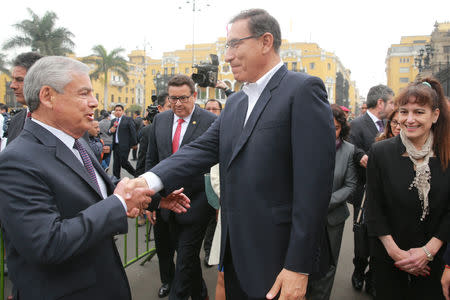Peru president confident Congress to back him in high-stakes vote
LIMA (Reuters) - Peru's centrist President Martin Vizcarra said on Wednesday he was confident lawmakers would renew their confidence in his Cabinet and avert a situation that could lead to the dissolution of his Cabinet and Congress.
Vizcarra called for a vote of confidence late on Sunday to ensure passage of four proposed bills aimed at fighting entrenched graft and rebuilding trust in public institutions following back-to-back scandals in recent years.
By making the legislation a matter of confidence in his government, Vizcarra hopes to check the power of the majority opposition party Popular Force that helped topple his predecessor six months ago.
A vote of no-confidence would force Vizcarra to replace his entire Cabinet. But, because Congress has already voted out one Cabinet in this government, he would also be authorized by the constitution to call new legislative elections in response.
I have "total confidence in receiving the vote of confidence today," Vizcarra told journalists outside the presidential palace surrounded by his Cabinet. "The four bills must be approved."
Popular Force, led by twice-defeated presidential candidate Keiko Fujimori, has not yet announced its position on the vote of confidence. Popular Force lawmaker Hector Becerril said Vizcarra wanted to turn Congress into "an appendage of the executive branch," adding in a plenary session on Wednesday that he personally was in favour of a no-confidence vote.
But with their jobs on the line, lawmakers unanimously passed one of the four bills on Tuesday and the head of Congress said the remaining three would be approved by Oct. 4, in time to put them to voters in a December referendum as Vizcarra wants.
Vizcarra's proposals, which require modifying the constitution, include a new system for selecting judges, a return to a bi-cameral Congress, stricter campaign financing rules and a ban on the re-election of lawmakers. He pitched them in July after an influence-peddling scandal in the judiciary triggered street protests and deepened distrust in institutions.
Prime Minister Cesar Villanueva warned lawmakers not to ignore widespread calls for change. "We see the current situation as a great opportunity to generate more credibility and legitimacy in politics," Villanueva said.
Peru, a regional mining powerhouse, has one of Latin America's most stable economies despite bouts of political instability in the past year.
Former President Pedro Pablo Kuczynski resigned in a graft scandal in March on the eve of a second impeachment vote backed by Popular Force. Vizcarra, who had been Kuczynski's vice president, replaced him with promises to fight corruption "at any cost."
(Reporting by Mitra Taj; editing by David Gregorio and Susan Thomas)



